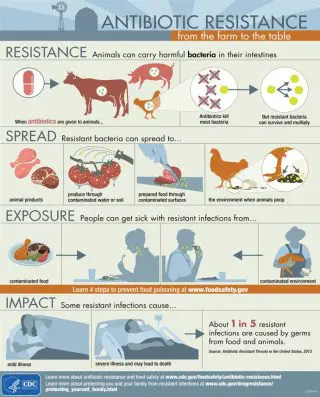 I’ve written about antibiotic resistance a number of times, and I have a section on it in the draft book on my journalism work.
I’ve written about antibiotic resistance a number of times, and I have a section on it in the draft book on my journalism work.
What is antibiotic resistance?
Antibiotic resistance happens when germs such as bacteria and fungi develop the ability to defeat the drugs designed to kill them. That means the germs aren’t killed and continue to grow. Resistant infections can be difficult, and sometimes impossible, to treat.
The misuse of medically important antibiotics is contributing to the rise and spread of antibiotic-resistant bacteria. It’s a growing public health crisis that’s responsible for 35,000 deaths and more than 2.8 million cases of illness each year in the United States, according to the Centers for Disease Control and Prevention.
What’s the latest on antibiotic resistance?
A coalition of public health advocacy groups has filed a lawsuit against the U.S. Food and Drug Administration or FDA challenging its refusal to phase out unnecessary uses of antibiotics in animal agriculture.
About two-thirds of antibiotics sold in the United States are used in food-producing animals, and are often administered to healthy animals to compensate for the higher risk of infections caused by cramped, unsanitary, or stressful conditions, according to the lawsuit.
The lawsuit alleges that FDA failed to adequately consider the evidence and ignored the problem presented in a 2016 petition. In that petition, public health and consumer groups asked the FDA to ban the use of medically important antibiotics for disease prevention in livestock and poultry if they aren’t ill.
Five years later, the FDA denied the petition. The agency’s denial failed to address the petition’s concern that use of medically important antibiotics for “disease prevention” purposes in livestock and poultry poses a significant threat to human health, the lawsuit states.
Plaintiffs in the case are the Alliance of Nurses for Healthy Environments, the Food Animal Concerns Trust, the Natural Resources Defense Council or NRDC, and Public Citizen.
“Since the 1970s, the FDA has recognized that the overuse of antibiotics in healthy livestock fuels the antibiotic resistance crisis and compromises the effectiveness of life-saving drugs for everyday people,” said David Wallinga, M.D., senior health officer for the NRDC. “It is shocking how little the FDA has done to safeguard public health from these risks in the last fifty years. The longer FDA waits to take action, the more people this crisis will harm.”
What can people do about antibiotic resistance?
Here are suggestions from health officials and health and consumer groups on what you can do about antibiotic resistance:
So, there’s a lot to do on this complicated issue. And, of course, the food and pharmaceutical industries lobby strongly and effectively to continue to be able to use antibiotics in animal production. But progress can be made. The European Union has banned the use of antimicrobials in food animal production, other than by veterinarian prescription for specific therapeutic use.
Originally Published on https://boomersurvive-thriveguide.typepad.com/the_survive_and_thrive_bo/
Notifications